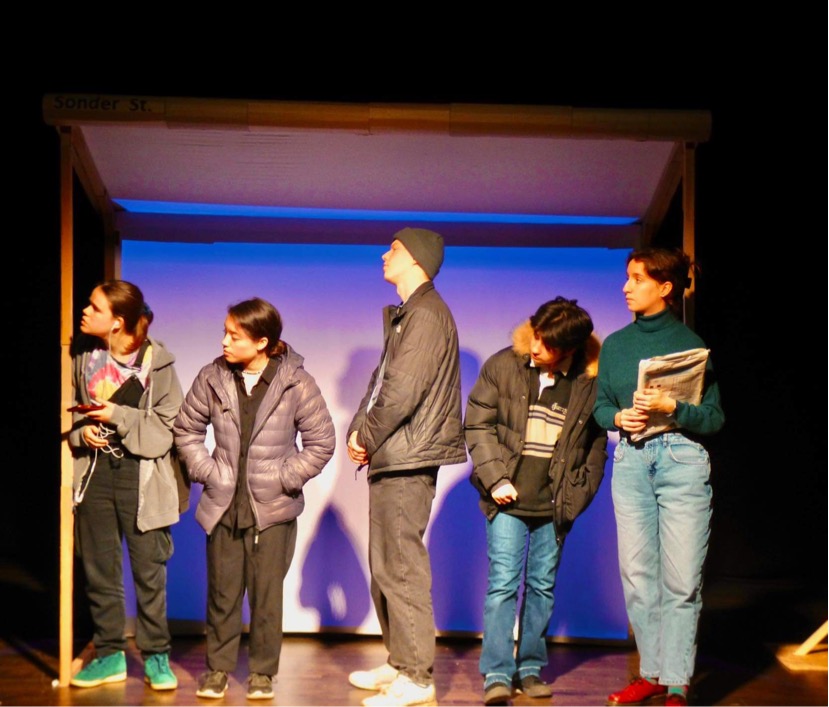The three plays performed as part of DDF’s Mark Hillery programme were proof of Durham’s dramatic talent. ‘Sonder’ by Anna West and Elena Jennings-Mares was an exploration of five strangers’ lives, using verbatim words from interviews with strangers; ‘Step by Step’ by Harry Threapleton followed Arthur, a teenage boy navigating family life after his parents’ divorce; and Marc Twinn’s one man show ‘Influenced’, allowed the audience to witness the downfall of a young man, Erik, and how his desire for social approval triggered a toxicity that soon became out of control.
‘Sonder’ opened the evening, and it did so with sophistication. Having conducted interviews with strangers from Durham, Anna West and Elena Jennings-Mares wrote the speech verbatim. The writers cleverly link these figures, sharing the notion that none of us are really that different. This was thoughtfully translated using the set, designed by Anna West, as projections explained to the audience that these characters were based off real people. The actors worked together throughout ‘Sonder’, with the physicality of the play one of its stand-out virtues; the unity of the cast in this physicality meant that no character outshone another. Instead, it felt as though each performer aided their co-stars, as it became increasingly apparent each had their own anxieties, traumas, and dreams. Moritz Alfridi played R, a Pakistani maths student whose home life had been impacted by war. Alfridi did an excellent job at showcasing both student-life struggles with pain that extends beyond Durham, beautifully portraying the impacts of war on the individual and reminding us that our peers may be facing difficulties beyond student-life. Alex Edwards was G, the Durham University porter; it was refreshing to see a figure so many students recognise, giving a voice to an individual that students often take for granted. Edwards deserves commendation for his stage presence, as his body language and facial expressions brought a buzz to his character that made him so compelling. My only critique is that I found the script relied on G a little too much for comic relief, and it occasionally felt like a caricature. Thea Steadman-Jones played M, another student, and especially shone when voicing her anxieties and hopes for the future, mounted on the cardboard boxes with a glimmer in her eye. Maria Enzo played E, the Greek dinner lady; fast and furious, she excellently portrayed the frustrations one has living in Britain when English is not your first language. Finally, Nat Pryke played A, the geologist. Pryke beautifully captured how fears of the future never fade, even at sixty-two, and her delivery of sincere moments of vulnerability were touching. The directing team of ‘Sonder’ (Elena Jennings-Mares and Anna West, assisted by Iris Varla) should be proud– the physicality they curated polished the play and allowed all characters to connect through their unique lives.
Harry Threapleton’s ‘Step by Step’ explored the relationships that grow between children and step-parents, and how the definition of ‘family’ is often much looser than expected. Edward Clark played Arthur, convincingly portraying the love, embarrassment, and different relationships a teen has with their parents. He was sincere when necessary, and wittily improvised when facing set-malfunctions. Whilst I found the script made Arthur too forgiving, often speaking to his parents with a sensibility few sixteen-year-olds have, Clark translated this well. I particularly liked the relationship between Arthur and his dad (George Thomas), with set helping to capture quiet moments between the two in the father’s flat. Nell Hickson as Arthur’s mum excellently tipped between comedy and sincerity to show mothers as individuals too. As Arthur’s mum’s new boyfriend Greg, Laurence Davidson stretched Greg’s football watching, gym coaching stereotypes confidently, and this worked well. I felt however, Arthur and Greg’s relationship needed more depth, and a more emotional conversation was needed between the two. As Elizabeth, Ellie Mather balanced the bumbling nerves of new love with the maturity of being a step-mother. As Sam, Greg’s previously hidden daughter, Clara Dammann used her body language to embody the moody teenager, but I felt as though the character was not given the space to develop. ‘Step by Step’ would benefit from less action and more emotional exploration, but that does not take away from the successes of writer Harry Threapleton, and the directing team of Alexa Thanni and Tom Burman, assisted by Lily Gilchrist, in displaying the heart-warming yet confusing complications of post-divorce life.
To close was Marc Twinn’s ‘Influenced’. The protagonist of this one-man show, Erik, began a YouTube channel, but only through critiquing feminism did views begin to climbs. Twinn’s writing is subtle in Erik’s downfall, cleverly including Erik’s opposition to this anti-feminism less and less throughout. We see the transformation of a man desperate for approval, and this could not be done without Ollie Cochran’s convincing performance. Firstly, I must applaud his stamina to perform the show with such conviction – being alone on stage is not easy. His performance was entirely captivating, switching from ambivalence about the channel to a frightening stoicism in which Erik begins to enjoy the attention he receives. He dominated the stage, switching from dance scenes to directly addressing the audience, always remaining switched on. I applaud the director Emily Kelly, and assistant directors Mindy Cao and Linus Cheung, who allowed Cochran to control the entire stage so fluidly. ‘Influenced’ was a thought-provoking piece, displaying the frightening reality desperate people will go to for approval.
Finally, kudos to the producers, production managers, stage managers, and tech operators of these shows. They were smooth, well-organised and each play benefitted greatly from excellent lighting design. These three shows showcased student talent, both in writing and performing, and were an excellent feature to Durham Drama Festival 2024.


